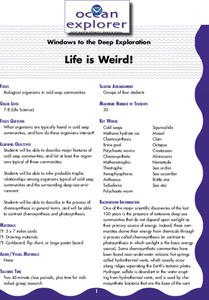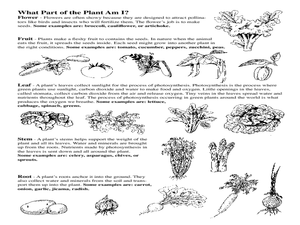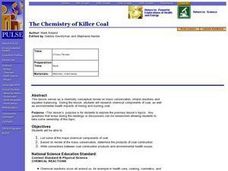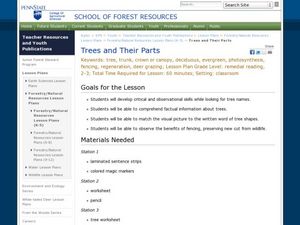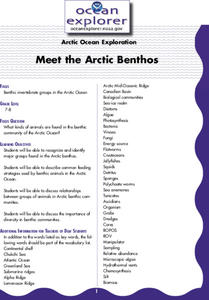Curated OER
Primary Producers
Students examine the role of carbon in the oceans and how phytoplankton determine the levels present. In groups, they practice measuring primary productivity using two methods. They use the internet to research the role of phytoplankton...
Curated OER
Carbon and Oxygen Cycles
Young scholars construct their own diagrams outlining the pathway of carbon and oxygen in the atmosphere. Students explain their diagrams outlining the pathway and teacher checks for accuracy and completion.
Curated OER
Life is Weird!
Students describe major features of cold seep communities, and list at least five organisms typical of these communities. They infer probable trophic relationships among organisms typical of cold-seep communities and the surrounding...
Curated OER
Bacteria Change Earth's Atmosphere
Tenth graders organize information to explain how photosynthetic bacteria contributed to climatic changes that happened on Earth. Students create a timeline by using a storyboard to tell the story of the change.
Curated OER
Teaching about the Chemistry of Oxygen Solubility
High schoolers explore solubility of gases in water, Henry's Law, LeChatelier's Principal, and supersaturation of gases in water.
Curated OER
Ecology: Trees
Fourth graders research and identify the different layers of the forest. As a class, they observe real-life trees or analyze a poster, and discuss the characteristics of each forest layer. Students then draw a forest and label the...
Curated OER
Smog Be Gone
Students begin the instructional activity by identifying greenhouse gases. In groups, they observe and record the effect of the gases on the atmosphere and the temperature of the Earth. They participate in activities that describe the...
Curated OER
Photosynthetically Available Radiation (PAR) Measurements Part 1: Calculating the Solar Constant using a TI-8
Twelfth graders are introduced to the term Photosynthetically Available Radiation. In groups, they participate in an experiment to determine how ecosystems survive the conditions in the Arctic. They calculate the amount of solar energy...
Curated OER
The Biological Carbon Cycle
Learners learn about the biological carbon cycle. In this carbon cycle lesson, students access the web site and mouse over the diagrams to follow the carbon cycle. They read about what happens to humans and plants during this cycle.
Curated OER
Plant Party
Students identify plant parts. In this plants lesson, students bring in a vegetable. Each student classifies which part of the plant their vegetable comes from (flower, root, ect.) Students identify the parts of their vegetable and later...
Curated OER
Making Community Measurements: Which Plant Part?
Students identify a plant in a given community and make a variety of measurements. They determine how a plant meets its basic needs. In addition to identifying plant parts, they observe seasonal change and compare plants within a community.
Curated OER
Plant Life
Seventh graders examine different categories of plant life and their roles as producers of food and oxygen for other organisms. They study the evolution of plants from simple organisms to very complex ones. They look at the different...
Curated OER
The Chemistry of Coal
Students investigate the chemistry of coal. This lesson serves as a review of conservation of mass, simple reactions and equation balancing. During the lesson, students research chemical components of coal, as well as environmental...
Curated OER
The Chemistry of Killer Coal
Students research chemical components of coal, as well as environmental health impacts of mining and burning coal. They discuss conservation of mass as it relates to combustion of organic compounds.
Curated OER
Plant Growth and Environment
Third graders bring to school various green plants and categorize them into plant leaves, stems, roots, and fruits. They answer the question, "How can you show there is starch in a plant?" and perform the iodine test and describe the...
Curated OER
Sea Ice Research
Students study sea ice and its importance in climate and climate change. They discuss sea ice as a presence of a food source for marine animals in the arctic and complete a lab activity. After completing the lab, they watch a video...
Curated OER
Dinoflagallates of Bioluminescent Bay
Fifth graders research dinoflagallates of the Bioluminescent Bay. They research the Internet for pictures of the Bio Bay and discuss the difference between ecosystems and ecoregions. They research a marine ecoregion and create a poster.
Curated OER
Give Me Some Air!
Third graders examine how trees produce oxygen. They examine satellite images of the reservation they examining and interpret the number of trees on the land. They determine how natural resources should be used wisely.
Curated OER
One Tough Worm
Learners explain the process of chemosynthesis. They are able to explain the relevance of chemosynthesis to biological communities in the vicinity of cold seeps.
Curated OER
Trees and Their Parts
Learners visit five learning stations to explore various aspects of trees. They look for tree names, match visual pictures to the written words of tree shapes, and observe the benefits of fencing and preserving new cut from wildlife.
Curated OER
Don't Marry the Mole!
Third graders examine the power of solar energy. In groups, they create their own pizza box solar oven to discover the power of the sun and how it is a source for heat and light. To end the lesson, they use the internet to examine...
Curated OER
How Much Water Does A Tree Transpire In A Day
Students engage in a lesson of investigating the amount of water that is transpired in a one day cycle. They conduct research to find the purpose of transpiration and find information to explain the value to a plant and explain how...
Curated OER
Rain Forests: Sustainable Use
Students discuss their opinion on a teacher given scenario. In this chemistry lesson plan, students research the value of rainforests. They relate these ideas to current forestry practices.
Curated OER
Meet the Arctic Benthos
Young scholars recognize and identify major groups found in the Arctic benthos. They describe common feeding strategies used by benthic animals in the Arctic Ocean. They discuss relationships between




